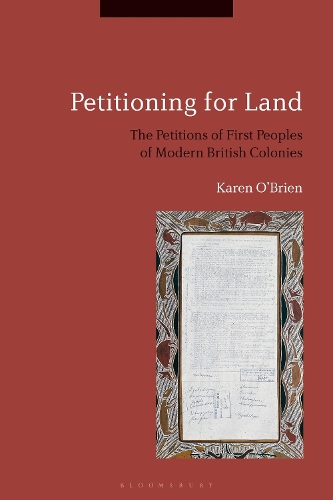
Petitioning for Land: The Petitions of First Peoples of Modern British Colonies
(Paperback)
Available Formats
Publishing Details
Petitioning for Land: The Petitions of First Peoples of Modern British Colonies
By (Author) Karen O'Brien
Bloomsbury Publishing PLC
Bloomsbury Academic
28th May 2020
United Kingdom
Classifications
Tertiary Education
Non Fiction
Legal history
305.809171241
Physical Properties
Paperback
232
Width 156mm, Height 234mm
331g
Description
Petitioning for Land is the first book to examine the extent of First Peoples political participation through the use of petitions. Interpreting petitions as a continuous form of political articulation, Karen OBrien considers petitioning for recognition of prior land ownership as a means by which to locate First Peoples petitioning for change within the broader narrative of historical and contemporary notions of justice. The book follows the story of First Peoples activism and shows how they actively reform discourse to disseminate a self-determined reality through the act of petitioning. It discloses how, through the petition, First Peoples reject colonialism, even whilst working within its confines. In a reconfiguration of discourse, they actively convey a political or moral meaning to re-emerge in a self-determined world. Taking a socio-legal and historical approach to petitioning, the book questions the state domination of First Peoples, and charts their political action against such control in the quest for self-determination. By uniquely focusing on the act of petitioning, which places First Peoples aspirants centre-stage, OBrien presents fresh and innovative perspectives concerning their political enterprise. From early modern colonial occupation to contemporary society, the hundreds of petitions that called for change are uncovered in Petitioning for Land, shedding new light on the social and political dynamics that drove the petitions.
Reviews
OBrien is to be commended for the extensive primary-source research she has conducted. * Journal of British Studies *
Petitioning for Land offers a powerful lens through which to analyze the complex historical negotiations between First Peoples and British colonial governments over land, identity and self-determination. Understanding the value of documents to mobilize communities, subvert authority, and resist colonial oppression informs contemporary usage of petitions by First Peoples, and underscores the need to think of petitions as a significant but largely overlooked technology of power. * Eve Darian-Smith, Professor of Anthropology, Law, and Global & International Studies, University of California Irvine, USA *
Author Bio
Karen O'Brien is Senior Lecturer in Socio-Legal Studies at the University of Sydney, Australia.
